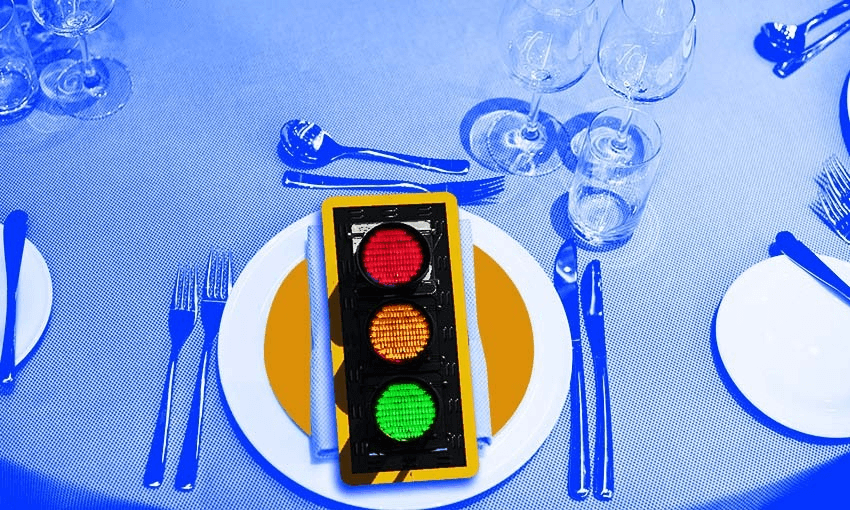If you’ve been asked for a vaccine pass recently, it’s probably been at a hospitality venue. Naomii Seah asks operators how life under the new rules is going so far.
“Hospitality is the face of the vaccine pass system,” says Marisa Bidois, CEO of the Restaurant Association NZ.
After a year of frequent and prolonged lockdowns, increasing economic and political pressure has meant the government had to find a way of opening up the country. Enter the Covid-19 Protection Framework, AKA the traffic light system. Although the system promised new levels of social freedom in the Covid era, poor communication and concerns from health and public officials plagued the traffic light announcements, creating uncertainty in the community.
One of the sectors most impacted by the lockdowns has been hospitality. With the announcement of the traffic lights, Auckland hospitality businesses have been able to open their doors after over three months of lockdown. But as Bidois notes, the sector is on the frontlines of the traffic light system, bearing the brunt of any teething issues. So what’s it like on the new Covid frontier?
“The red light has been great,” says Rebecca Smidt of Dominion Road’s Cazador restaurant and delicatessen. Smidt notes that although it’s been “tricky” dealing with some restrictions, “we’re making it work”.
“Our staff just want to work and do their jobs to their full ability,” Smidt continues. “Being able to step back into their professional roles has been wonderful, and a morale boost for the whole team.”
Chloe Ann-King, of Raise the Bar Hospo Union, says her community of workers has also been feeling that excitement. Many of the union members are veteran workers, says Ann-King, so “they’re excited to be back at work, they’re excited to be creating awesome environments [again]”.
But some members of the industry disagree. Andrew Targett, of Pearl Kitchen in Tauranga, says that in his community there’s “underlying frustration and sadness and anger there… the traffic light system almost feels like it was rushed and not thought out”.
Targett feels the new system has caused a “division in the industry”, and says aspects of the regulations have been “traumatising”, including having to let an unvaccinated staff member go.
“Emotionally, we felt forced into a corner,” he says.
Ann-King disagrees with Targett’s assessment, arguing that Covid and the traffic light system are simply exacerbating existing issues in the industry, not creating new ones. The majority of New Zealanders are now vaccinated, she notes, and among hospo workers the biggest issue is not loss of work, but rather employer non-compliance.
“We’re hearing that employer[s are] creating health and safety issues… [like] letting unvaccinated people onto the premises,” says Ann-King. She also cites instances of employers not following the proper processes for employees who might require vaccination exemptions.
“Covid has probably compounded this,” says Ann-King, “[but] there’s always been huge health and safety issues.”
She adds: “A lot of employers have failed to do proper health and safety inductions, and they’re not following Covid rules,” leading to unsafe working environments.
In the Covid context, those unsafe working environments now include non-compliant customers. Leandro Massariolo, of Benger Garden Cafe in Ettrick, Central Otago, says the first day of the traffic light system was “overwhelming” for him and his front-of-house staff. That included an incident where “a threat was involved,” though he now emphasises it’s “water under the bridge”.
Smidt’s establishment has had “people trying it on with fake passes and fake exemptions”, but notes that “it’s nothing we can’t really deal with… we’ve copped our fair share of – let’s say – feedback,” she laughs.
But Smidt says that although it’s a “frustrating” situation for staff, overall “we’re seeing amazing customer response and behaviour… and we’re seeing people really celebrate the level change”.
“[There’s] a real festive buzz through the transition,” Smidt continues, “but commercially there are still some pretty dire consequences.”
Targett agrees the system is impacting the sector financially, saying that for his business, “the traffic light system isn’t working for us, 100%”. He says that turnover is down by a third, and his establishment is running 50% behind its 2020 figures. “We’ve already had two years of hell,” he says, “and financially, there’s no reserves left.”
“I don’t feel we’re being looked after.”
Both Targett and Smidt have lost their usual schedule of corporate functions this year, which Targett cites as one of the reasons he doesn’t feel the traffic light system is working.
But Smidt disagrees. “Of course we notice and miss [the lack of functions], but we anticipated that would be the case and adjusted our stock levels and plans accordingly,” she says.
“I’m feeling pragmatic about the future,” she says, noting that while the current hospo rules might be tough to deal with, “there’s not really any other way to go about it”.
“I’m not able to influence the pandemic,” she concludes, “so it is what it is.”



